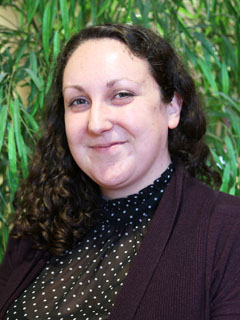In a new study led by Associate Professor Lynn Perry, researchers have found that the specific types of words children know first can be an early predictor of language difficulties.
The paper, “Late bloomer or language disorder? Differences in toddler vocabulary composition associated with long-term language outcomes,” which was recently published in Developmental Science, suggests that the number of words toddlers know that name things that are similar in shape, such as cup, ball, and spoon (i.e., “shape-based nouns”), can differentiate between children who are considered late bloomers and those who have persisting delays months or years later.
 “Some children who are late talkers and show initial delays in their vocabulary as toddlers, eventually catch up to have a typically sized vocabulary. We call these children late bloomers,” said Perry, who studies child language development in the Department of Psychology. “But some late talkers do not seem to catch up, and so far, researchers have been unable to predict early on who is going to be who.
“Some children who are late talkers and show initial delays in their vocabulary as toddlers, eventually catch up to have a typically sized vocabulary. We call these children late bloomers,” said Perry, who studies child language development in the Department of Psychology. “But some late talkers do not seem to catch up, and so far, researchers have been unable to predict early on who is going to be who.
"In our study,” she adds, “we wanted to figure out which children with slow initial vocabulary development would be late bloomers and which might have persisting delays in vocabulary growth.”
Persisting delays could also be an indicator of developmental language disorder (DLD). About seven percent of the population has DLD, but it’s not very well-known compared to other developmental disabilities, according to Perry.
“DLD is characterized by persisting delays and difficulties in language throughout the lifespan, but it’s not typically diagnosed until school-age, because there aren’t any good early predictors for who might catch up and who might need more support,” said collaborating author Sarah Kucker, an assistant professor of psychology at Oklahoma State University. “This is the goal of our current study—to see if the type of words a child knows in toddlerhood can predict later delays.”
The research team’s prior work suggests that most children with typical vocabulary development learn a lot of shape-based nouns during toddlerhood.
“When children learn a word like ‘cup,’ they figure out that even though there are different cup colors and materials, they all have the same approximate shape, which is the same with spoon, ball, table, and so on,” said Perry. “Once children learn a lot of these shape-based nouns, they automatically pay attention to shape as they learn new words and can start learning new words more quickly. So we thought knowledge of shape-based nouns might be important to investigate in children who are late talkers.”
The team used extensive datasets of vocabulary development in three groups of over 800 children—those who were late talkers in toddlerhood but had a more typically sized vocabulary months later (late bloomers); those who were late talkers in toddlerhood and continued to have delays in their vocabulary months later (persisting late talkers); and children who had typically sized vocabularies throughout both time periods.
The team used a parent-report measure of children’s vocabulary knowledge when children were about 16 months old and again when they were about 28 months old to assess the proportion of shape-based nouns children knew, controlling for their vocabulary size. At 16 months, those children who would become persisting late talkers knew a smaller proportion of shape-based nouns than late bloomers and typical talkers.
A subset of the participants were followed until they were 7 years old to see if any received a diagnosis of DLD. Children who were later were diagnosed with DLD also knew a smaller proportion of shape-based nouns at 16 months than other children.
Perry says the study can be useful for parents, early child educators, and speech language pathologists who work with young children with language delays.
“It’s beneficial to know who might need extra support and what kind of support different children with language delays might need,” she said. “Perhaps, helping late talkers learn more shape-based words in particular, could be helpful for language development as they get older.”
Perry worked on the collaborative study with Sarah C. Kucker at Oklahoma State University, Jessica S. Horst at the University of Sussex in the UK, and Larissa K. Samuelson at the University of East Anglia in the UK.

